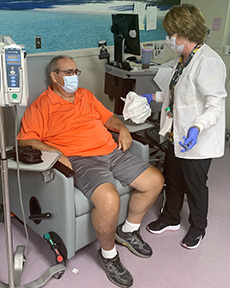
Army Veteran John Ellis is the first patient at the North Florida/South Georgia VAMC to be treating with innovative immunotherapy treatment recommended by Jessica Schmit, MD, the VAMC’s Hematology and Oncology Section Chief. Photo from July 21, 2021, VAntage Point blog
ATLANTA — VA researchers provided a glimpse of the department’s commitment to addressing blood cancers in veterans and taking a lead in the battle nationally at the 63rd American Society of Hematology Annual Meeting in Atlanta.
VA presentations last month covered the full spectrum of blood disorders and tackled issues from recruiting participants in clinical trials, speeding diagnosis, matching best treatments and enhancing survivorship.
More than 4,000 veterans are diagnosed with a blood disorder each year. Several types of hematologic malignancies are considered presumptive disorders associated with exposure to Agent Orange or other herbicides during the Vietnam War and other conflicts. The presumptive blood diseases include chronic B-cell leukemias, Hodgkin’s disease (Hodgkin lymphoma), multiple myeloma and non-Hodgkin lymphoma.1
At the meeting, Daphne Friedman, MD, of the Durham VA Health Care System and Duke University School of Medicine, both in Durham, NC, discussed the VA’s efforts to increase diversity among participants in clinical trials for blood cancer therapies. Friedman and her VA colleagues worked with the Leukemia & Lymphoma Society’s (LLS) Clinical Trial Support Center (CTSC), a nurse navigation system for clinical trials open to patients with blood cancers and their oncologists.2
The researchers looked at the barriers to clinical trial participation by veterans and found that veterans who received care through a VAMC located in an urban area had significantly more opportunities for trial participation than those served by rural VAMCs. In addition, veterans in the Midwest had fewer opportunities than those residing on either coast.
Of the 48 veterans identified with blood cancers at the Durham, NC; Salem, VA.; Sioux Falls, SD; and Clarksburg, WV. VA facilities who were considered for clinical trials during the period examined, 14 were determined to be poorly suited to trials by their providers based on the need for immediate therapy, co-morbidities or circumstances that would make participation challenging. Thirty-four veterans were asked if they wanted information about clinical trials; 14 declined a referral to the LLS CTSC for reasons including preferring care through the VA, wanting a standard therapy, and transportation issues. The VA providers referred 20 veterans and two enrolled in a clinical trial.
Based on this review, the researchers concluded that barriers included rural location, provider prescreening and patient preferences. Overall, “when offered information about clinical trials, the majority of patients agreed to an LLS CTSC referral, suggesting that patients are generally willing to receive education and information about trial participation if given the opportunity.” Nurse navigators such as those at the LLS CTSC could overcome some of the barriers by identifying trials closer to veterans’ homes and educating veterans about trials, while expanding trials in rural areas and within the VA could also increase participation by a broader range of veterans.
COVID-19 Vaccination
Nathanael Fillmore, PhD, of the VA Boston Healthcare System, Harvard Medical School and Dana-Farber Cancer Institute and his colleagues examined the effectiveness of vaccination to prevent COVID-19 in veterans with multiple myeloma (MM). Patients with MM have previously been estimated to face a mortality of 30% when infected with the coronavirus.3
The researchers identified 4,367 veterans with MM who received vaccination for COVID-19 during the study period. They matched 1,606 of those vaccinated veterans to an equal number of unvaccinated or not-yet-vaccinated veterans with MM. They also matched 2,476 vaccinated cancer survivors to an equal number of unvaccinated controls.
At a median of 44 days follow-up, vaccine effective in the matched MM cohort was 22.2% (95% CI, -133 to 82.7%), starting 14 days after the second dose, with 14 veterans infected after vaccination. For cancer survivors, the effectiveness was 82.3% (95% CI 16.4 to 100%) beginning 14 days post-second dose, with 10 veterans infected after receiving the vaccination. The team concluded that vaccination had reduced effectiveness in veterans with MM, “likely due to a co-existing immunosuppression both due to the disease process as well as associated therapy.” They recommended additional studies to determine whether patients with MM “would benefit from post-vaccination serologies or a booster vaccination” or other therapies.
CNS Relapses in DLBCL
While central nervous system relapses in patients with diffuse large B-cell lymphoma (DLBCL) are not common, preventing them is a priority for patients with high-risk features. Philip Haddad, MD, of the Overton Brooks VAMC in Shreveport, LA., and colleagues conducted a meta-analysis of 21 studies with 11,507 patients to determine which prophylactic approach best reduced the risk of such relapses—intrathecal chemotherapy (IT), high-dose systemic therapy, or a combination of both.4
They determined that IT prophylaxis, high-dose chemotherapy and no prophylaxis all had statistically similar relative risk of CNS recurrence. “However, the combination of IT prophylaxis and high-dose chemotherapy was found to be significantly associated with a reduced RR of CNS recurrence when compared to IT prophylaxis IT (RR=0.28, 95%CI 0.13-0.58), high-dose chemotherapy (RR=0.34, 95%CI 0.14-0.80), and no prophylaxis (RR=0.41, 95%CI 0.19-0.87).”
- Zullig LL, Sims KJ, McNeil R, Williams CD, Jackson GL, Provenzale D, Kelley MJ. Cancer Incidence Among Patients of the U.S. Veterans Affairs Health Care System: 2010 Update. Mil Med. 2017 Jul;182(7):e1883-e1891. doi: 10.7205/MILMED-D-16-00371. PMID: 28810986; PMCID: PMC5650119.
- Friedman DR, Rodgers TD, Szumita L, Weiss ES. Identifying and Overcoming Barriers in Clinical Trial Enrollment for Veterans with Blood Cancers. Abstract 1920. ASH 2021. Dec. 11, 2021.
- Fillmore NR, La J, Tsu-Yu Wu J. Branch-Elliman W., Huhmann L, Han SS, Parmigiani G, Tuck DP, Brophy M, Do NV, Lin AY, Munshi NC. Inadequate SARS-CoV-2 Vaccine Effectiveness in Patients with Multiple Myeloma: A Large Nationwide Veterans Affairs Study. Abstract 400. ASH 2021. Dec. 12, 2021
- Haddad PA, Hammoud D, Gallagher KM. Effective Central Nervous System Prophylaxis Chemotherapy Approach in High-Risk Diffuse Large B-Cell Lymphoma: A Network Meta-Analysis. Abstract 1461. ASH 2021. Dec. 11, 2021


